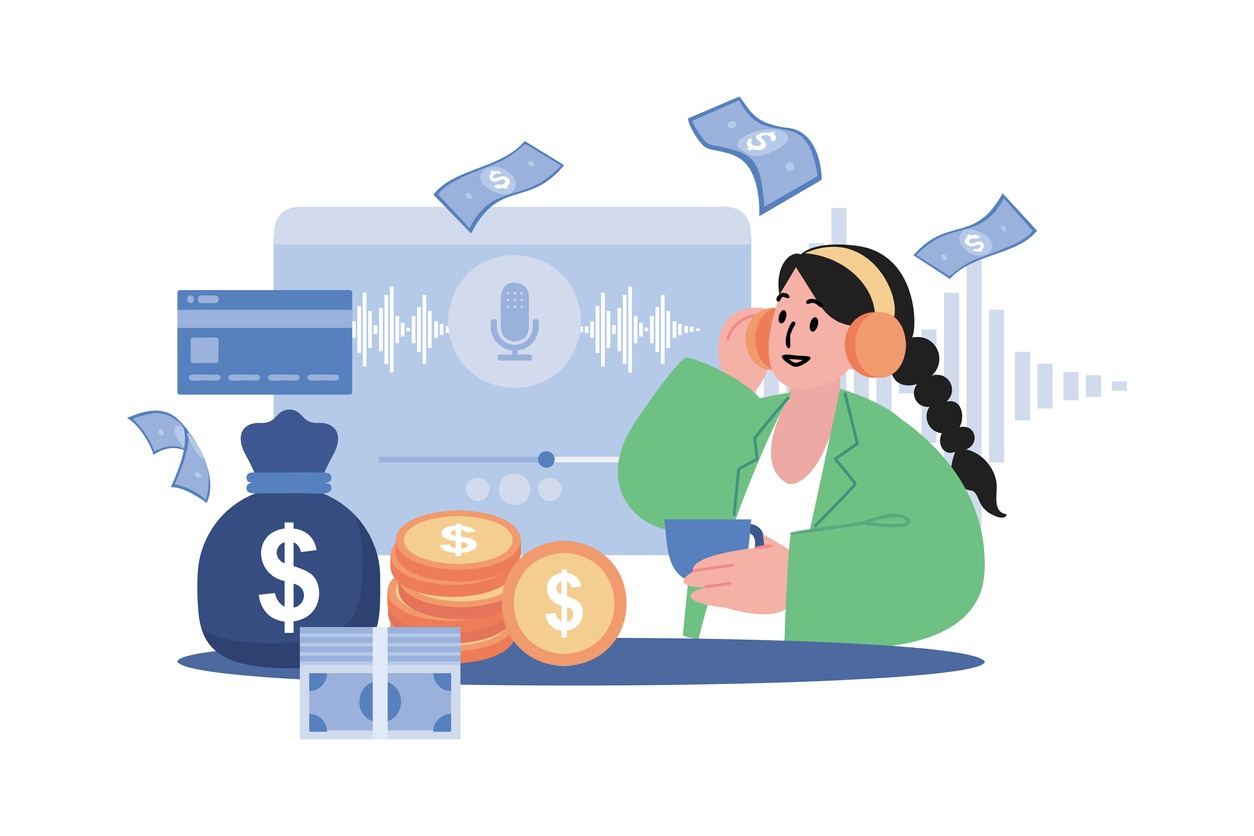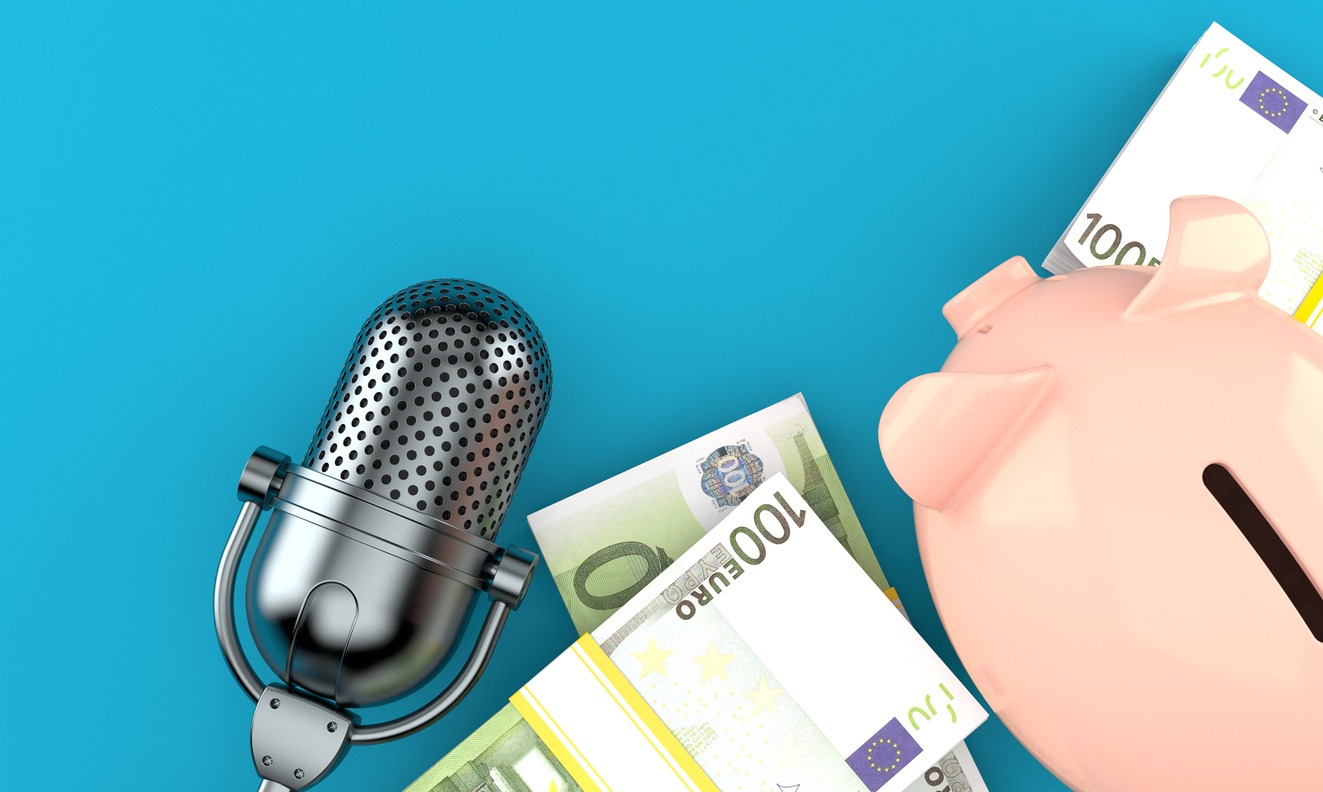Are you passionate about podcasting? Does broadcasting your thoughts and opinions to the world bring you joy? Fantastic! You can transform that passion into a profitable endeavor.
While it’s not automatic that once you start a podcast, you have to expect some earnings. Many people who tried podcasting only earned real money by selling their equipment. But monetizing a podcast is entirely feasible – lots of podcast hosts are making a living from it right now, while others are content covering their hosting expenses or treating themselves to a takeaway every now and then. After all, where else can you get paid for talking about your favorite topics?
Are you eager to learn how to turn your podcast into a money-making venture? Discover effective strategies to make your podcast stand out, gain more listeners, and earn extra cash in this article.
Promoting Your Podcast: More Listeners, More Money
If you’re launching a podcast, don’t expect instant financial returns (unless you’re already famous). For the average person like you and me, the first step is building a community of listeners by:
- Creating top-notch content. This is the most important step. Give your audience something worth listening to.
- Ensuring your podcast is available on platforms like Spotify and Apple Podcasts.
- Consistently releasing podcast episodes.
- Spreading the word and sharing your podcast on social media.
Once you’ve built an audience, you can start cashing in with some podcast monetization strategies.
With over a million podcasts out there, getting noticed requires some effort. So, to gain audiences, it’s crucial to focus on branding and marketing strategies. This step is vital as it helps you build a larger and more loyal audience, which can eventually translate into paying listeners. Here’s what you should do before delving into monetization:
1. Invest in quality equipment
If you’re serious about podcasting, consider investing in quality equipment to enhance your audio and video. If your podcast is not pleasing to the ears, they will quickly jump to another one.
Research your niche thoroughly and aim to deliver value to your audience, whether that means educating them or entertaining them.
2. Engage with your audience
Once you’ve chosen your platforms, start posting updates:
- Let your followers know when the next episode is due for release.
- Give them a sneak peek of what to expect.
- Share the topics that will be covered.
After the episode, share some of the best quotes or lessons discussed, ask your followers what they enjoyed about the episode, and initiate a discussion thread on a specific topic (“What are your thoughts on…?”). Encourage people to interact and express their opinions, and when they do, respond to their questions and “like” their comments. Active engagement with your followers will make them more likely to become loyal listeners.
3. Organize contests and giveaways
Another way to interact with your audience is by organizing giveaways and contests. Using your social media channels, you can incentivize your followers to participate in various activities to win prizes. For instance, you can ask them to share the podcast with a certain number of friends, mention their favorite episode, or answer questions about your show. Prizes could include merchandise, exclusive content with special guests, or products from sponsor companies. These promotions are highly effective because they promote your podcast through your audience’s network and foster engagement between your followers and you.
4. Share your show on YouTube
YouTube has evolved from a platform for amateur videos into the world’s largest online video platform. By uploading a video version of your podcast to YouTube, you can significantly expand your show’s digital footprint.
Having a presence on YouTube allows your podcasts to reach a broader audience and attract new listeners who don’t often frequent podcast hosting sites. YouTube will also recommend your show to new listeners who share similar interests. Podcasts on YouTube can also create extra content, such as video clips, highlights, and behind-the-scenes footage that isn’t available on audio-only platforms.
Additionally, the comment section and social features on YouTube provide opportunities to build a community of engaged fans who can interact with you and other listeners. This fosters listener loyalty and creates a sense of community around your show.
5. Create an eye-catching podcast cover
To entice people to hit that “play” button, you must convince them that your podcast is worth their time. Having an engaging name and an intriguing concept is a great start, but sometimes, that’s not enough – you also need a compelling podcast cover.
An attractive cover art can draw more people to your show because it’s often the first thing potential listeners notice when browsing podcasts within an app. The good news is you don’t need to be a graphic designer to create an appealing logo. There are websites and apps like Canva or Adobe Spark that let you design your own for free. Just make sure to check the podcast directories’ artwork specifications, as your image must meet specific technical requirements (such as resolution or file type) to display correctly.
If you’d rather leave the design to the pros, consider hiring a professional designer.
6. Leverage social media
Using social media is an essential step in promoting your creative content. It’s cost-effective, user-friendly, and has an extensive reach. A highly effective strategy is to share short, captivating clips from your podcast. It’s a powerful way to boost your visibility on social media platforms and give your audience a taste of the value your podcast offers.
While Facebook and Twitter are popular platforms among podcasters, your choice should align with your target audience and the nature of your podcast. For business or marketing podcasts, LinkedIn is key. If you prefer a more visual approach, consider using Instagram.
Getting active on social media doesn’t mean you have to invest hours of extra work. Many social media platforms favor short-form videos. Record your podcast as usual, and find share-worthy short moments, transforming your long-form podcast into short, ready-to-share clips. Thankfully, you can try AI tools like Riverside’s Magic Clips that can do that for you! You can customize them to your liking and even add quick captions using AI transcription.
To expand your reach, ask your podcast guests to share the episode on their own social media channels. Their followers are likely to listen and follow your podcast if they enjoy it, especially if you feature other guests who appeal to them.
7. Optimize your podcast with SEO
Search Engine Optimization (SEO) is all about boosting the quantity and quality of traffic to your podcast through unpaid search engine results. In the world of podcasting, SEO means fine-tuning your content so that people who are searching for it can easily discover it. Ultimately, SEO helps you reach a broader audience and stand out. There are several steps you can take to optimize your content:
Create audio transcriptions
Transcribing your podcast episodes can significantly enhance your podcast’s searchability. It gives search engines, such as Google, a clear understanding of the content within your episodes. Transcriptions also enable these platforms to index your podcast, resulting in improved search results. Moreover, transcribing your audio makes it easier for you to explain the episode’s content in your show notes (as discussed below). While various transcription tools are available, you might not need extra software. Some recording platforms come equipped with built-in transcription features.
Make some show notes
While the audio (and video) is the heart of a podcast, enhancing your episodes with supplementary written content adds more value to the overall experience. Show notes consist of a written description of what occurred during an episode and any additional resources that complement the discussed content, such as links to social channels, articles, guest bios, and more. Employing show notes can significantly boost your SEO efforts because they rank for relevant keywords and searches, making it easier for others to discover your podcast.
Pro Tip: Streamline your workflow by creating show notes using your transcriptions in conjunction with AI software. You can generate show notes in mere minutes, then review, edit, and customize them as needed.
Establish an effective website
A dedicated website for your podcast becomes a central hub for all your content, including audio and more. Having a podcast website enhances your show’s discoverability by making it easier for search engines like Google to index your podcast.
Incorporate episode keywords
Being deliberate about your podcast’s keywords is crucial. Even if your episodes share a similar theme, using distinct focus keywords for each episode can expand your reach. How do you choose keywords wisely? Look for “high-density” keywords, those that are frequently used on webpages. Tools like Google’s Keyword Planner can assist you in this task.
8. Promote your podcast with advertising
Paid advertising can be an effective way to drive traffic and connect with your target audience. If you’re willing to invest some money to reach a wider audience with your podcast, this option is worth considering.
9. Connect with fellow podcasters
Collaborating with other podcasters can significantly expand your reach and introduce your content to new audiences. Being featured on a preferably more popular podcast can help you reach listeners who may not be familiar with your show. Additionally, bringing other podcasters onto your podcast as guests can be mutually beneficial.
When collaborating with fellow podcasters, ensure that you promote the collaboration by tagging them on your social media and sharing content related to the partnership. This not only adds diversity and fresh ideas to your podcasts but also provides an opportunity for audience crossover, allowing for wider content sharing. Ultimately, this approach can boost your listenership and promote your show effectively.
How to Make Money with Your Podcast
Once your podcast is up and running, you might be thinking about how to turn your efforts into profits. Building a successful podcast involves understanding your audience and delivering what they want. To make it profitable, you need to take some additional steps. Here are some key ways to monetize your podcast:
1. Sponsorship Deals
Podcast sponsorship is one of the most common ways to monetize. It’s also one of the easiest, as there’s no set number of listens or downloads you need to attract sponsors.
Sponsorship involves reaching out to relevant sponsors or brands in your niche to advertise their product or service. You’ve probably heard podcast hosts begin their show with phrases like, “This episode is brought to you by [brand name].” This is a sponsorship mention. It may also occur during the episode (mid-roll ad).
Sponsorships not only promote your podcast but can also bring in a significant income. With affiliate marketing, you earn a commission by referring people to other companies. While these methods can be lucrative, they may come with some creative limitations, as brands may have specific content requirements they want to be associated with. Securing sponsorships is more straightforward if you’re a skilled podcast host with an established audience.
Keep in mind that not all companies you approach will be willing to offer money or products easily. In such cases, you can also inquire about them promoting your podcast on their social media. While not as attractive as financial support or free equipment, a simple mention from a reputable company can expand your audience and provide more promotional opportunities. This can be especially helpful in the early stages of your podcasting journey.
2. Promote affiliate partnerships
Affiliate marketing or partnerships involve promoting other products or services using a special link. When your podcast listeners click on this affiliate link and make a purchase, you earn a commission from the sale.
Companies like Skillshare and Amazon offer affiliate programs that allow you to become an affiliate and start earning. The amount of money you can make from affiliate marketing typically depends on the size of your podcast audience.
It’s essential to promote products or services you genuinely believe in. This not only helps you earn commissions but also builds credibility and trust with your audience.
The amount of money you can earn through affiliate marketing generally correlates with the size of your podcast audience. Usually, there’s no need to negotiate or seek approval. You can simply sign up, provide your payment details, and start earning whenever someone signs up or makes a purchase through your affiliate link.
3. Offer premium or exclusive content
Another way to generate income is by directly asking your audience to subscribe to a paid membership. The only catch here is the additional workload.
Selling premium content is a fantastic way to elevate your podcast business to the next level. This approach involves charging a subscription fee for unique or exclusive content that isn’t available on your regular podcast feed. Premium content refers to material that’s exclusively accessible to paying listeners, offering an added layer of value and exclusivity.
For instance, you might release two episodes each week, with one being free and the other requiring payment. However, the paid content must be truly special. It could include:
- Extended Q&A podcast episodes with guests
- Live-recorded shows
- Video versions of your episodes
- Ad-free content
- Online courses or workshops
Remember, both free and paid content should provide value to your audience to keep them engaged. To start offering premium content, consider signing up for membership platforms that can help you distribute these exclusive episodes.
4. Request donations
A straightforward way to make money through podcasting is by simply asking for donations. You’d be surprised at how many fans are willing to contribute a few dollars to support their favorite podcast. It’s also an excellent way for new podcast creators to start earning immediately because it’s easy to promote.
There are various services you can use to collect donations, including PayPal, Stripe, and GoFundMe. Once you have an account, add the donation link to your podcast description and encourage your listeners to contribute whatever they can.
By accepting donations from your listeners, you can potentially reduce or even eliminate the need for external funding or sponsorships to cover all your podcasting costs. Alternatively, it can complement other monetization options, such as selling podcast merchandise.
While this form of self-promotion may not be for everyone, it’s an effective way to connect with your audience. Be genuine in your reasons. Do you need donations to invest in better podcasting equipment? Will the contributions help produce more episodes or higher-quality content? Transparency with your audience goes a long way, and they’ll be more inclined to donate when they know where their money is going.
5. Join a podcast advertising network
Podcast advertising networks are third-party platforms that act as intermediaries between podcast hosts and sponsors. Some well-known networks include AdvertiseCast, Midroll, PodGrid, and Podcorn.
These services insert advertisements into your podcast episodes and pay based on the number of impressions, typically measured as CPM (Cost Per 1,000 Impressions). However, it’s important to note that they also take a percentage of your earnings. It’s crucial to carefully review the platform’s terms and conditions to understand the commission structure.
Depending on the size of your podcast audience, you have the potential to earn anywhere from a few hundred dollars to tens of thousands by partnering with an advertising network.
6. Sell merchandise
If you have a dedicated and enthusiastic audience, it might be time to create and sell your own branded merchandise. This can include items like T-shirts, hoodies, stickers, and keychains, all featuring your podcast’s name, logo, or a beloved catchphrase.
When it comes to selling merchandise, the best approach is typically through your podcast’s website. Alternatively, you can utilize a third-party platform that handles the production and sales of podcast merchandise.
Selling merchandise not only strengthens your connection with your audience but also expands the reach of your podcast. It’s an excellent way to generate revenue while offering your listeners tangible items they can use to show their support for your show.
The most popular merchandise items often include t-shirts, hats, mugs, hoodies, stickers, posters, and tote bags, all adorned with your podcast’s logo or catchphrase.
Fans are usually eager to purchase these items as a sign of their loyalty and to connect with fellow listeners. Furthermore, merchandise serves as a form of mobile advertising as fans proudly display and use these items, promoting your podcast to a broader audience.
To make merchandise available risk-free, consider partnering with a print-on-demand provider. This way, products are created only after orders are placed, eliminating concerns about unsold inventory. Once your merchandise is designed, you can link it to your Spotify artist profile.
7. Sell online courses
If your podcast serves as an educational platform and aims to teach valuable skills or knowledge, consider creating an online course to monetize your content. Many platforms, such as Udemy and Skillshare, provide accessible options for content creators to develop their own courses.
These platforms are an excellent starting point due to their user-friendliness and simplicity in setting up courses. As your courses gain traction and success, you might want to consider transitioning them to your own website to maximize your earnings.
8. Host live events
Another way to monetize your podcast is by organizing in-person podcast events, also known as “IRL” (In Real Life) events. This strategy is most effective when you have a dedicated and potentially local audience willing to attend. It also requires a substantial listenership to ensure profitability, even if only a small percentage of your listeners can attend the event.
Hosting live events can generate substantial revenue. Here’s a simple illustration: If each event ticket is priced at $100, and you have a regular listenership of 30,000 people, with just 1% (300) showing up, you would earn $30,000 in event revenue.
How Much Can You Earn By Podcasting?
The potential income from a podcast varies significantly and depends on several factors, including your podcast’s download numbers and the monetization methods you employ. While it’s challenging to provide an exact figure, a podcaster with around 10,000 downloads per episode can earn anywhere from $300 to $5,000 per episode.
To maximize your podcast’s revenue, consider using a combination of monetization methods that align with your content and audience. The key is to find a balance between creating valuable content, building audience loyalty, and generating income. By exploring various podcast monetization approaches, you can transform your podcast from a passion project into a potentially lucrative venture.







